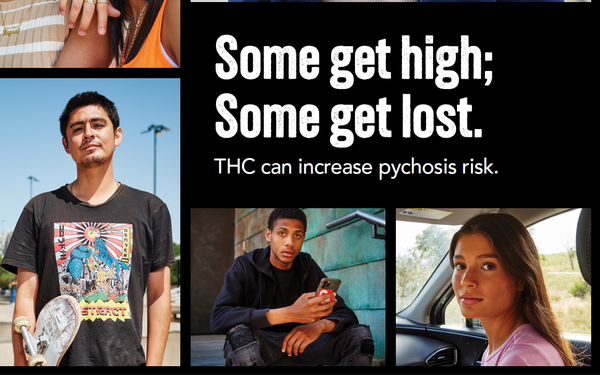
Colorado, which became the
first state to legalize cannabis in 2013, is now also first in calling out the health risks of high concentrations of THC, pot’s pyschoactive ingredient.
A 2021 state law directed the
Colorado School of Public Health (ColoradoSPH) to study the health effects of high-concentration THC and then create a public education campaign.
The result is “The Tea on
THC,” launched last week in partnership with public benefit marketing/consulting firm Intium Health and encompassing a multitude of resources designed both to raise awareness and foster open
dialogue These include a comprehensive website, podcasts, social media, posters and
videos. The campaign targets multiple audiences, including pregnant women, youth, young adults, parents and mentors.
advertisement
advertisement
The effort is being backed by paid ads on the web, search engines, social
media, and OOH via billboards and transit. The ads -- with scannable codes that bring people to teaonthc.org -- feature such messages as “Is marijuana becoming your best friend?” and
“Is your teen dabbing?”
If you don’t know what dabbing is, neither did Laura Stack, founder of Johnny’s Ambassadors, a nonprofit dedicating to educating parents and
teens about the dangers of high-THC marijuana. “If I had known then what I know now, I think I could have saved him,” she says in one of “The Tea on THC”’s many
educational materials. Stack's son, Johnny, developed psychosis before taking his own life. (Dabbing is “a method of consuming marijuana in a concentrated form,” per the Partnership to End
Addiction.)
Besides psychosis, other symptoms of high-concentration THC may include cognitive impairment, mood swings and increased risk of car accidents, according to "The Tea on
THC."
How intense has the average concentration of THC become?
“In 1983, THC concentrations averaged around 3%,” says “The Tea on THC.” By 2008, it was up to
37%. And now, “THC levels in concentrates such as oil, shatter, dabs, and edibles can be up to 95%.”
One victim, now recovered, appears in an 11-minute-long campaign video punningly titled “Former NFL Receiver Brandon Lloyd Catches Good Health After Dropping Cannabis.” Lloyd, who played for the
Denver Broncos among other teams, says in the video that “all those tropes about marijuana not being addictive were just so false, the high-concentration marijuana was incredibly
addictive.” But, “you’ll see there’s way better highs out there” once the pot is replaced with “vigorous exercise,” communicating with supportive friends and
acknowledging that “it’s ok not to be ok.”
Other firsthand testimonials in the campaign include stories from students at 5280 High School, a recovery-focused Denver
school.